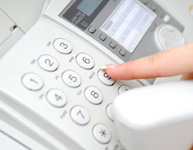Although it may be difficult, remember that the 9-1-1 call takers are trained to provide you with the emergency assistance you need. If you are able to remain calm and answer the questions they ask you will be sure to get the response you need. Emergency assistance is often on the way while you are still on the call. If you are yelling or crying it may interfere with the call taker’s ability to understand you and require repeating information needed by the emergency responders.
You can reach 9-1-1 using just about any device that can make a phone call. This includes traditional landline service, cell phones, VoIP or TTYs. Text messages can also be sent to 9-1-1 from a cell phone.
Each of these types of services may provide different information to the 9-1-1 call taker about the location from which you are calling.
Cell phone calls may only provide the call taker with general information regarding the area in which you are located.
TTY users can directly dial 9-1-1 from the TTY, all 9-1-1 centers are equipped with TTY service.
Public safety and private industry telecommunications professionals are working together to make sure that 9-1-1 will work the same on all devices in the future but until then it is important for the consumer to be aware of any limitations associated with the telecommunications device being used. FCC 9-1-1 website http://www.fcc.gov/pshs/services/911-services/Welcome.html .
If you dial 9-1-1 by accident, please stay on the line and advise the 9-1-1 call taker of the error. If you hang up, the call taker may be required to call you back or send an emergency responder to your location. This will tie up resources that could be used for a true emergency. Additionally, when reporting an actual emergency keep in mind that the call taker can dispatch emergency responders to your location without disconnecting your call. By staying on the line you can provide additional information and updates that may further assure your safety as well as that of the responders and others involved in the emergency. The 9-1-1 call taker will let you know when it is safe for you to end the call.
Some situations may be personal emergencies but do not require the response of emergency assistance. 9-1-1 is a valuable resource and should not be called to find out if the schools are open during a snow day, general information, problems with a pet, paying tickets or because you need directions. Inappropriate calls to 9-1-1 tie up access and waste resources needed for true emergencies. New Jersey has a strict law [N.J.S.2C:33-3 False Public Alarms] against making false or prank calls to 9-1-1 and violators will be prosecuted.
